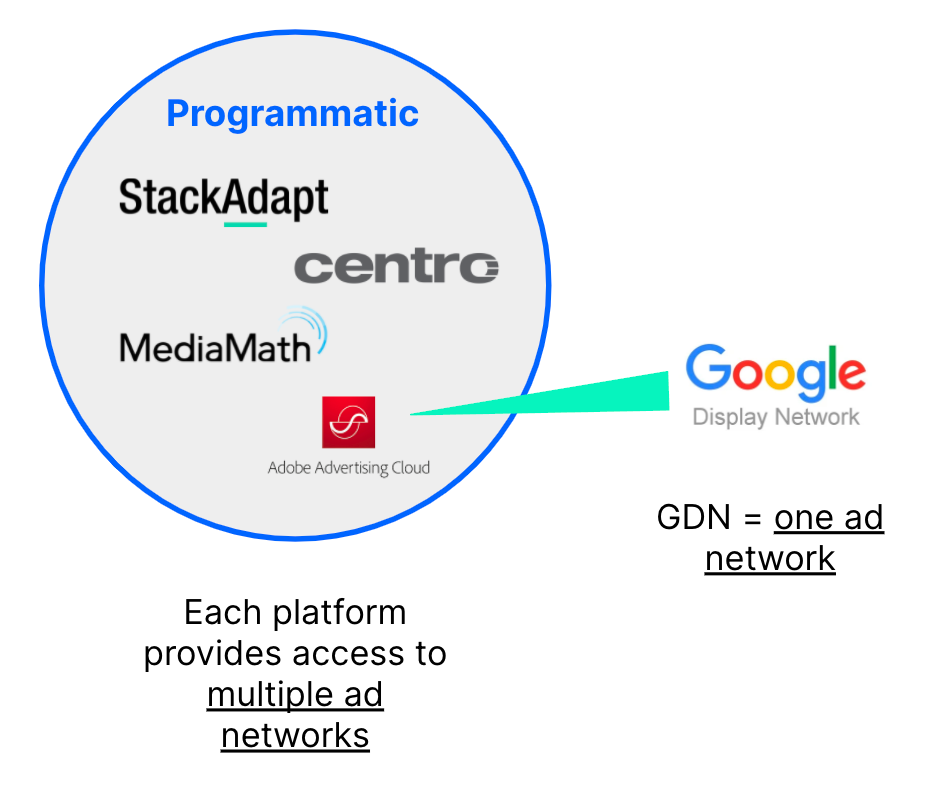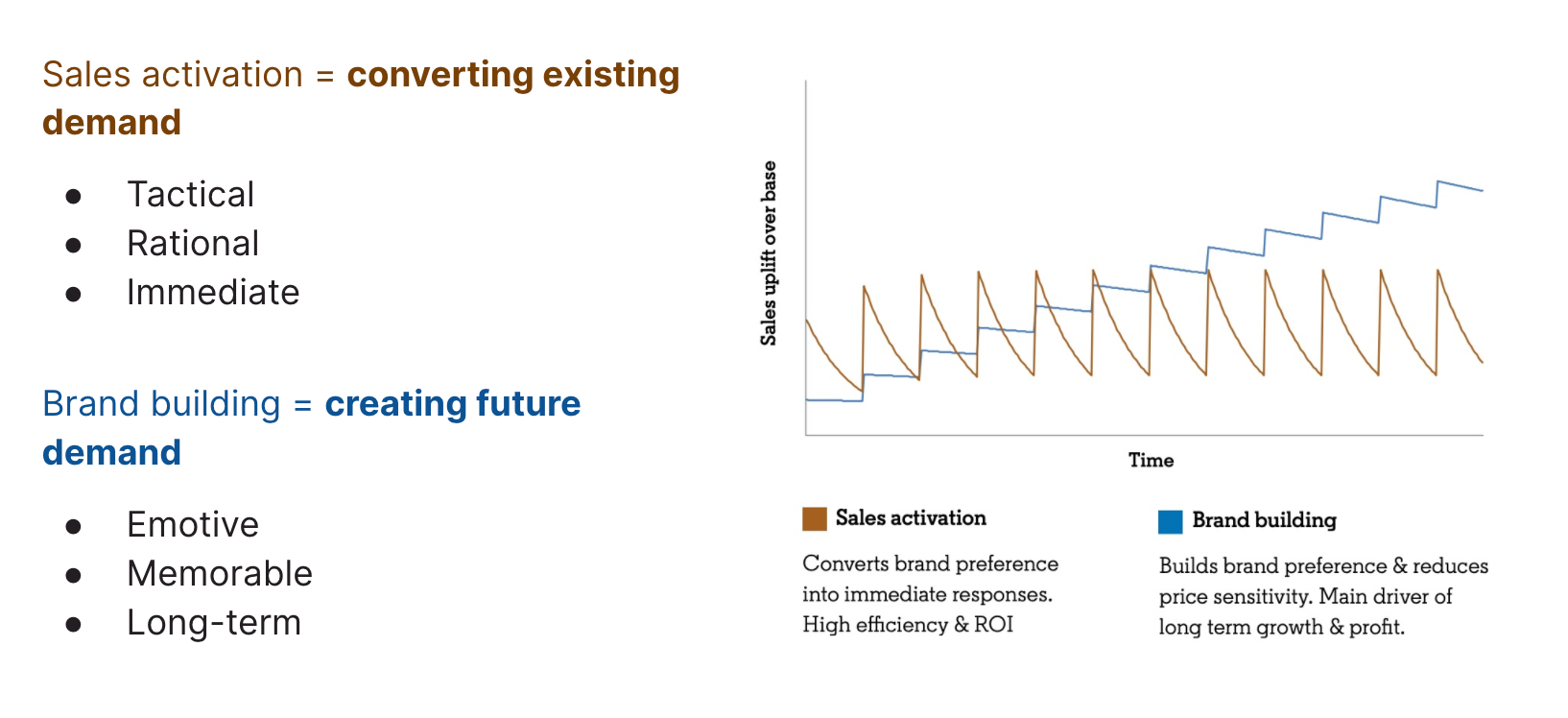Organizations of all sizes and industries stand to learn about and explore the world of programmatic advertising.
But for those that might have more limited resources (and time), knowing where to get started can be tricky.
Read on to learn how to embrace and start building your business’s strategy for programmatic advertising.
What is Programmatic Advertising?
Programmatic advertising uses algorithmic technology to buy and sell advertising space. The term programmatic refers to how the advertising space is bought and sold.
This does not mean the entire ad buying process is automated; you’ll still need to input details around targeting, budgets, and desired results to enable the software to buy the right advertising space based on your business goals.
Programmatic ad buying offers mass distribution for advertisers looking to reach a wider audience across the internet.
For smaller businesses, it’s worth noting that programmatic ad buying is not a free auction platform (like Google’s Display Network – see next section!). To access the available inventory (websites), you must source a programmatic advertising (SaaS) platform.
What’s The Difference Between “Programmatic” And Google’s Display Network?
If you’re reading this post, you’re likely familiar with the Google Display Network (GDN).
The GDN is only a small part of the total available inventory (ad space) for display advertising online – and as such, it is more affordable for smaller businesses just starting out with display.
However, the GDN is just one ad exchange, and most programmatic platforms enable access to multiple ad exchanges in the same platform.
-
 Image created by author, August 2022
Image created by author, August 2022
Remember, the GDN is just one ad exchange.
A programmatic platform opens up a wider variety of inventory, meaning more space for your ads to be served.
Programmatic platforms also enable a wider variety of ad formats not available on the GDN, such as audio ads, connected TV, and video.
Why Invest In Programmatic?
Programmatic ad platform costs are usually only a small % of advertising spend and can yield much greater returns for small to medium enterprises (SMEs) and global brands, so don’t ignore programmatic just because you are a smaller business.
Here are a few reasons why programmatic is worth considering as an alternative to GDN for your business:
1. Variety Of Ad Formats
One of the fundamental principles of advertising is that businesses must invest in brand-building activity (think highly visual ad formats such as TV, audio, and display) alongside immediate sales activation (think bottom-funnel activity like paid search).
Brand-building can help drive the biggest long-term sales uplift for any business, whereas sales activation type advertising often tends to have a less long-term impact on a brand and can be turned on and off, much like a tap.
-
 Image by author, August 2022
Image by author, August 2022
Programmatic display ad formats can support brand-building activity due to their visual nature.
The variety of ad formats available through programmatic platforms really lends itself to brand-building advertising.
This includes but is not limited to:
- Native advertising – Advertorials.
- Display – Static and interactive.
- Video – In-platform and CTV (connected TV).
- Audio – In-platform (e.g., Spotify), podcast ads.
The cost per thousand impressions (CPM) model means that you pay for impressions and not engagement on programmatic, which is why it lends itself better to brand-focused activity (focused on reach/impressions) vs. direct response campaigns.
2. Premium Inventory
The main question I am usually asked by smaller businesses considering programmatic is around the benefits over and above GDN.
The answer is the quality and diversity of publications you can access outside of Google.
For example, in most programmatic platforms, you can access direct deals with premium publishers that Google simply wouldn’t provide access to in GDN.
This means access to top-tier publications in your industry that aren’t available through placement targeting in GDN.
It is worth noting that programmatic and Google do share inventory for ad purchases.
For example, sites such as weather.com are available on programmatic platforms and through the GDN.
3. Targeting And Efficiency
Programmatic advertising is designed for efficiency.
Depending on your business goals, an algorithm will determine where your cash is best spent.
Similar to most ad platforms, you’ll still need to input details on your target audience, campaign objectives, and desired CPM targets, but the platform will do the heavy lifting.
Rather than bidding on inventory through multiple ad exchanges, programmatic ad platforms allow advertisers to streamline management into a single platform, increasing the simplicity and efficiency of managing your advertising activity.
4. Reach And Scale
Programmatic platforms offer increased scale and reach by leveraging algorithmic ad buying technology across various advertising exchanges.
This means a shift from 1:1 ad buying to a 1:many ad buying model.
Indeed, programmatic spending in 2021 hit $105 billion and is projected to increase in 2022 to $123 billion, over 90% of total digital ad spend.
This clearly shows that programmatic technology is rapidly taking over how we buy and sell advertising.
Are Your Competitors Already Investing In Programmatic Display?
If you’re interested in finding out whether your competitors are already investing in programmatic advertising, there are a few options, depending on your budget.
You can use paid-for tools such as SimilarWeb to assess competitor spending across different ad networks.
SimilarWeb is more expensive than tools such as Semrush and Ahrefs, but it does have more accurate data on website traffic, in my experience.
If you’re on a budget, you can use the free tool MOAT to check the actual creatives your competitors are running and when they were running across different ad inventory.
-
 Image created by author, August 2022
Image created by author, August 2022
How To Find A Programmatic Partner For Your Small Business
As you may have grasped, starting with programmatic advertising is more expensive due to platform costs (usually billed on a % of spend model). Still, the various benefits will certainly outweigh the additional costs.
There are many different platforms, but I would suggest going directly to an agency or partner with the necessary software and expertise for programmatic ad buying through an existing partnership with platforms such as Centro or StackAdapt.
More resources:
- A Complete Guide To Mastering B2B Programmatic Advertising
- 10 Top Advertising Campaigns & Why They Work
- PPC 101: A Complete Guide to Pay-Per-Click Marketing Basics
Featured Image: ArtemisDiana/Shutterstock





![AI Overviews: We Reverse-Engineered Them So You Don't Have To [+ What You Need To Do Next]](https://www.searchenginejournal.com/wp-content/uploads/2025/04/sidebar1x-455.png)